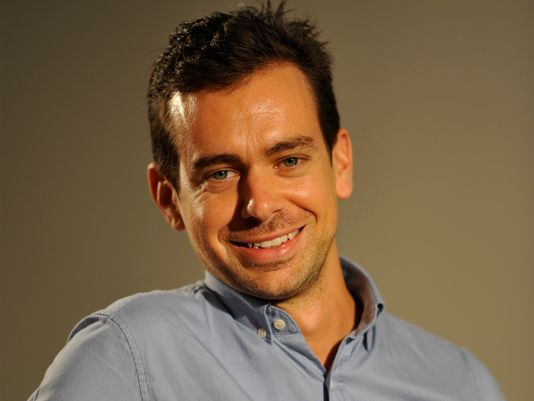Square's Jack Dorsey goes recruiting in NYC
NEW YORK — Jack Dorsey invented Twitter, which last week filed paperwork to go public, and redefined mobile payments with Square, which is ready to move into sparkling new headquarters in San Francisco.
Yet, he was simply Jack, Square recruiter, when he spoke to several hundred students at Columbia University here Monday night. While regaling them with stories about his youthful obsession with punk music, surrealism and St. Louis, he also made a full-throated appeal for entrepreneurial talent.
"This city has something different than Silicon Valley," Dorsey said minutes before he took to the stage. "San Francisco is great. But New York has people, dynamics, intensity."
Dorsey's visit underscores what is a budding movement among New York entrepreneurs to raise the city's profile in tech. Mayor Michael Bloomberg has started an initiative to draw engineers and designers from Silicon Valley to relocate to New York.
The 36-year-old Dorsey said New York was considered as headquarters for Square four years ago — except it was hard to find engineers and designers.
"There is a big transformation in New York," says Richard Witten, a special adviser to the president of Columbia University, who heads the school's entrepreneurship initiative. "The city's dependence on financial institutions has waned," and it needs to appeal to tech start-ups and behemoths.
Kevin Zhang, president of the Columbia Organization of Rising Entrepreneurs, was among the students wowed by Dorsey's personal journey and keenly interested in Square. "I really got the sense that maybe he was the only person who had different pieces that could have come together into Twitter," Zhang says.
During Dorsey's day Monday, he and his handlers allowed a USA TODAY reporter to shadow him for several hours — rare access to arguably one of Silicon Valley's most successful entrepreneurs and the subject of intensified interest as Twitter hurtles toward an IPO.
Earlier, at USA TODAY's bureau here, Dorsey, spoke with editors and reporters for an hour to give an update on Square's revenue growth, its expansion plans and the multibillion-dollar mobile-payment market.
Dorsey continued his cone of silence on the micro-blogging service's plan to go public in coming months, which could revitalize investors' appetites for consumer tech companies.
"No comment," Dorsey said in the first interview since Twitter filed paperwork to go public on Thursday. But he offered that the climate in Silicon Valley is focused, but not as fervently as it was during the tech bubble of the late 1990s. "I don't think of it as a bubble or resurgence (now)," he says. The business models of today, he adds, are "more substantial in providing value."
Twitter's planned IPO could lead, in part, to more tech-related stock offerings from the likes of Box, Dropbox, King.com — maybe even Square, say tech analysts such as Patrick Moorhead, principal analyst at Moor Insights.
Dorsey offered other thoughts on a broad range of topics, including:
• Apple. "The tech they're producing is fantastic again," says Dorsey, who attended Apple's press conference last week announcing the multicolored iPhone 5c and the high-end iPhone 5s, which comes with fingerprint authentication, a new camera and 64-bit technology. Square and other developers of apps benefit when Apple takes an innovative step, he says.
• Twitter as a political tool. "It is an amazing tool for the man on the street," Dorsey says. "There is a misnomer you have to tweet to find value." The art of aggregating content, for example, is an accurate barometer of "the pulse of the election cycle," he says.
• Cool, new gadgets. Two camera apps — Snapchat and Frontback — are at the top of his list, because they advance the concept of snapping pictures, he says. Snapchat is responsible for 350 million photos a day; Frontback allows photos from the front and back of iPhones and iPads, so a baseball fan, for example, can shoot their reaction to a play they photograph.
The best technology, he says, is that which "reminds us of who we are — the use of a finger to swipe a smartphone screen, fingerprints for authentication, the voice to command a computer," he says.
• Competitiors. Square is vying with PayPal, Intuit and others in the mobile-payment processing market. "We're flattered by how they have changed their business" to compete with Square, Dorsey says, ticking off its roster of sellers that include coffee shops, taxi drivers, painters and clothiers. One famous merchant — boxer Floyd Mayweather — sells his merchandise via Square.
• Business partners. Since Square signed a deal to supply 7,000 Starbucks stores with its hardware and software, there has been speculation on which national brand might next join forces with Dorsey and Co. Though Square is working with Burberry, it is not pursuing large national deals, Dorsey says. "Starbucks pursued us," he says.
• The next big thing. On what might follow Twitter and Square, Dorsey was coy. He says Twitter and Square occupy most of his time, and "I like to go deep on things," he says.
The Columbia recruiting trip is part of a hiring binge. The 600-employee Square is exploring opportunities to lease additional office space in Soho here, and will soon move into a new headquarters near Twitter in San Francisco that can initially house 1,000. A year ago, Square employed 300.
In the past year, Square has expanded to Canada and Japan while adding millions of small-business owners as customers. The company's various gadgets and services are used in the transactions at an annual rate of $15 billion worth of merchandise a year, as of May, compared with $10 billion in November.
The current total does not include Square's technology deal with Starbucks, announced late last year.
Some 26 million small businesses in the U.S. do not use credit cards, leaving Square plenty of room to grow, Dorsey told a small gathering of students, university officials and local press before his speech.
References
- ^ http://twitter.com/jswartz (twitter.com)










